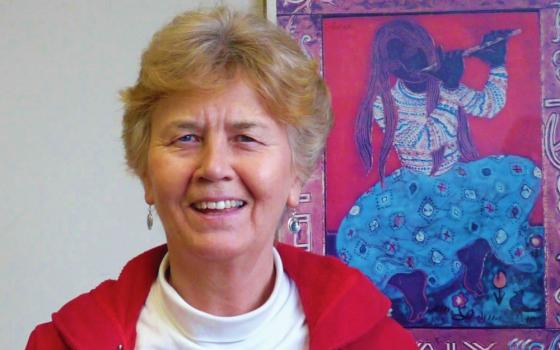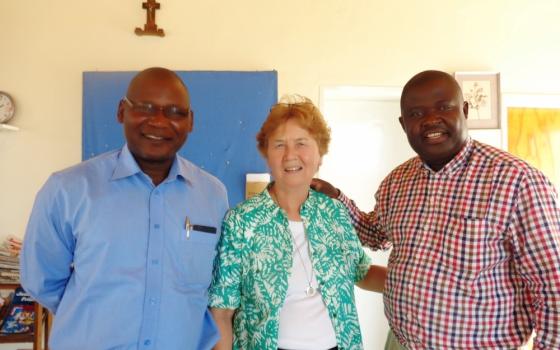Sr. Lucy Thorson arrived in Jerusalem in September 1973, just before the Yom Kippur War. She expected to spend one year there to take a university course but ended up staying for 18 years.
She experienced living and working on a Kibbutz, learned Jewish and Israeli traditions, celebrated Jewish festivals and found studying from "Jewish masters" there to be a "great privilege."
"I'm ever grateful for that," Thorson said.
The Saskatoon-born Catholic sister joined Sisters of Our Lady of Sion when she was 19 after she finished high school. She saw the congregation as an opportunity to get out into the world, and its base in Jewish history and Jewish-Christian relations became the path she followed through her career and life.
Thorson received a master's degree in theology and Jewish studies in a joint program between Hebrew University and St. Michael's College at the University of Toronto then focused her research on the communal dimensions of repentance in Jewish-Christian liturgy.
As a provincial superior based in Jerusalem, Thorson worked with Western and Middle Eastern sisters in Turkey, Egypt, Lebanon, Tunisia and Israel. She later moved to Rome and, eventually, back to Canada.
Thorson said she has always used her location as a starting point to listen and learn from people who are different from her. She faced challenges living in international communities, complex situations with people from differing religions, but found deep richness and enrichment throughout her experiences.
Problems in Jewish-Christian relations are often highlighted, she said, but there are many positive developments worth celebrating, including giving thanks for one's past, recommitting to present growth and the desire to "embrace the future with hope."
In 2013, with the Sisters of Sion, Thorson responded to a request by religious in Harare, Zimbabwe, to teach short-term Bible studies and Jewish-Christian relations to seminarians and laypeople. Thorson said that work is a new way of "migrating our charism," as the Sisters of Sion can share their knowledge and teach in new areas even when they do not have the capacity to build a whole new community.
Thorson continues her work in Jewish-Christian relations with the Scarboro Missions Interfaith Department just outside of Toronto. She's involved with a local TV series on Salt and Light, a Catholic television station based in Toronto that showcases contemporary voices who have contributed in Jewish-Christian relations.
A few years back, Thorson started a multifaith weekly discussion group for university students at the University of Toronto's Multi-Faith Centre. Four years later, the students have taken it over and now run programming and the weekly meetings and invite Thorson to attend.
GSR: Why are the Salt and Light videos about pioneers and change-makers in Jewish-Christian relations important in today's growing multicultural context?
Thorson: For us as Christians, wherever we are, it's not a luxury, it's a necessity for us to be familiar with our Jewish roots, and it's vitally important to understand Judaism at the time of Jesus and also the Judaism of today.
In other words, [we must continue to] witness faith and light of the Jewish community today and also to provide the possibility for people of the next generation to be aware and informed of developments in Jewish-Christian relations since the Second Vatican Council. It's a great challenge that I experience as a Sister of Sion, to get the Catholic Church's new understanding since the Second Vatican Council down to the grassroots, to the level of the pews, and to the so-called "ordinary Christians." In my opinion, this involves ongoing education for every new generation.
There's been a new understanding of our relationship with the Jewish community during the Second Vatican Council, in particular, recognition that the covenant relationship of God with the Jewish people still continues, is valid, is alive and continues to be lived and witnessed in Jewish communities today. That is a new emphasis in the church's teaching and theology and a very, very important one.
Tell us about the interfaith program for university students. What has their response been?
Students come together, Christians, Jews, Muslims and students from many different faith communities. What they are looking at is justice issues through a multifaith lens. That's very interesting because what we do together, and what they've taken the leadership of, is exploring different justice issues such as refugees or care of environment and women/gender, justice/peace-building. They look at the issues from diverse faith perspectives, mainly from the Jewish, Christian, Muslim faith perspectives.
It's a real hope, and it's a real joy to see these groups of younger adults in university from diverse faith backgrounds working together to take concrete actions of social engagement. They discuss together but then choose to do concrete initiatives. For example, they have been working with refugees, and they have been working with some of the young people that are here from families of refugees and helping them with the language, with English. Language is key to entering into a new culture. That's one of the things they've been helping them with.
They've also set up a food bank for people who live on the street here in Toronto. That was very spontaneous and creative on their part. It began as small noon-hour discussion group, and the students themselves really got involved. They want to do hands-on work, so they have taken and are taking concrete actions to be engaged socially.
It's extremely encouraging. It was most interesting when students said to me, "By the way, we're doing this project and these gatherings at noon, would you like to come?" And I said, "Oh, yes, I would be interested." So I took part as a participant in some of their seminars, and it was very positive. It's where I want to put a lot of my energy, passing on to the next generation the interest in and commitment in interreligious relations.
What would you want future generations to know about interfaith relations/engagements?
I think future generations are going to find themselves in a multicultural context, wherever they are. I would hope the next generations are truly open to be educated about one another and that they are willing to listen and learn from those who are different. I would hope that they would be courageous to move into the unknown and willing to take risks to develop interfaith or interreligious relationships and to know that it involves patience and respect and education. It's a need in our world today to be involved in interreligious dialogue and relationships.
Do you think the multicultural world could lead to assimilation and/or loss of religions or cultures?
I don't think it's a threat at this point. From my experience, I think there is awareness of what is important to be aware of and educated in your own religious identity. I think that's very important for this generation and the next generation: You need to be well-grounded in your own faith tradition as you enter into dialogue with someone of another religion. That way, you don't lose your identity, but you can be enriched and challenged by the other.
I studied for five years at Hebrew University in Jerusalem. I was the only Christian in my courses, and I studied Jewish thought and philosophy, and it was an experience of being challenged as to how I live my own faith. It wasn't a question of passing over into the other faith tradition; but rather, I could be challenged by how they lived their own faith tradition. I had that experience over and over again. It wasn't a question of assimilating, but rather trying to be open and to listen and learn from the other.
How have you seen the Holy Spirit in your work?
I certainly see the Holy Spirit has been leading me and us along the path over the years. The spirit reminds me of the words of our [Sisters of Sion] founder, Fr. Theodore Ratisbonne, who was a French Jew who became a Christian in the 19th century. The words of Theodore are an inspiration of the Spirit to me, over and over again: "Put all in God's hands and go forward with confidence as if you are certain of the future."
I have that posted on my closet door at home. "Put all in God's hands and go forward." Often, we can be paralyzed by obstacles or issues, but he said, "Go forward with confidence as if you are certain of the future." I think the Spirit has very often reminded me of that invitation to trust, and there's always going to be lots of unknowns and surprises; I've certainly experienced that over the years.
The Spirit today is calling us to work collaboratively as religious communities in the church. I gave you the example of the collaborative project with Holy Trinity College in Harare, Zimbabwe, and also where I'm working right now, with Scarboro Missions. I'm working collaboratively with them in interfaith initiatives. I really feel that's a call of the Spirit today: to work with, together, and to build relationships.
We [Sisters of Sion] could seem to think that we are small in number, but there are new creative ways to live our charism now. I just gave you the one example: being present in other countries where we are called and being present in new ways. For example, short-term teaching sessions: We have gone to Zimbabwe; we've been called to the [Democratic Republic of] Congo; we've recently been called to Kenya for short-term sessions. I feel that's the work of the Spirit, inviting us to live our charism in new expressions.
[Dana Wachter is a freelance journalist and digital storyteller based in London, Ontario.]


